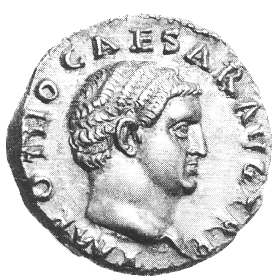 Contents --
Previous Article --
Next Article
Contents --
Previous Article --
Next Article
Embarking on a murderous rampage, the members of the Praetorian Guard who were supporters of Otho hunted down their political victims and slaughtered them in the streets of Rome. Thus began the reign of this emperor who was destined to suffer a similar fate himself. Angry at not having been the one chosen as Galba’s adopted son and heir to the throne, Otho encouraged several of the Praetorian Guardsmen to proclaim him emperor. Galba was thrown from his sedan chair to the ground where the soldiers did their bloody work on him, hacking and stabbing him to death. As he lay dying, he asked "Why, what harm have I done?" His adopted son and heir to the throne, Lucius Calpurnius Piso Licinianus, was dragged out of a temple and beheaded on the spot. Several others that were close friends and advisors of Galba were hunted down and killed that day.
This was the year A.D. 69, the "Year of the Four Emperors." According to the historians of the time, Suetonius and Tacitus, the army detested Galba because they felt he was stingy with bonuses and unduly harsh in disciplining the troops. The Roman legions in Spain, Gaul, and Germany were either in revolt or at the point of mutiny. The Praetorian Guard, stationed close to Rome, were supposedly the Emperor's privileged bodyguard. In fact, they were more likely to murder an emperor they didn't like than to protect him. The Praetorians supported Otho as emperor to replace the hated Galba. However, the legions in Lower Germany favored Aulus Vitellius and began to march on Rome to put him on the throne.
Otho's troops marched north to meet the challenge, but Otho waited until too late to send them. Near the town of Cremona in what was called the First Battle of Bedriacum, Vitellius' generals Valens and Caecina utterly defeated Otho's armies. When news of the defeat reached Otho, he decided to end his life by his own hand. Otho was Emperor of Rome for only ninety five days. Tacitus records that Otho states the reason for his suicide was to prevent the shedding of more Roman blood. Tacitus hated the civil wars that ravaged the empire during his time and thus believed that Otho was a true patriot whose suicide was a noble act. If Tacitus had lived for another four hundred years, he would have been very disappointed by the changes that occurred in the government of the Roman Empire. The pages of Roman history were filled with tragic accounts of Roman armies fighting each other for control of the empire up until the very end of the age.
Go to next article on Emperor Vitellius
Go back to previous article on Emperor Galba
Return to Roman Emperors List